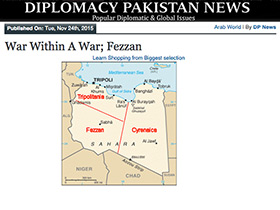
Fizzan, as the Arabs call it, or Fezzan as is called in English, is the symbol of isolation and solitude in the Turkish culture …
Fezzan, which is 600 kilometers from the coast of southwestern Libya is famous for its deserts. It is one of the most important regions of Libya with its ground water, oil and natural gas beds.
The greatest peril that was foreseen for the post-Gaddafi period in Libya was a civil war that would take place among the tribes. It was seen unavoidable that a civil war triggered by the tribes that have spread beyond the country’s borders, would affect a wide geography extending all the way to Senegal, Mali, Chad and Sudan and cause a crisis that could ultimately stretch to South Africa.
Today what was feared turned out to be true in Fezzan, which makes up the southwestern border of Libya.
The absence of any border security in the region increases the likelihood of illegal entry from neighboring countries into Libya. As will be remembered, an example of this was experienced following France’s intervention into Mali on January 12th, 2013 when a large number of terrorist groups crossed the borders and took refuge in Fezzan. No doubt this situation makes solving the problems in Fezzan more difficult.
Disunity in the region is at its highest level. The Nigeria-Chad border and the Kufra district are in the grip of groups affiliated with the Tebu tribe. The Algerian border and a large part of Fezzan are under the control of groups of Tuaregs, the biggest ethnic community of the country. Even the Tuareg and Tebu tribes, which are the major elements of the population of Fezzan, are divided into smaller entities within themselves. Furthermore, the addition of scores of other tribes such as the Kazazifa, Vurfelle, Hasawne and Mehamid into these tribes, and the old remnants of the Gaddafi regime, have caused the beginning of a quite gloomy period for Libya.
The objective of each group in this civil war is to become the sole ruler of that region. In order to accomplish this, border domination, smuggling routes, control checkpoints, oil and natural gas regions, military headquarters and arsenals become the targets. The income earned by the control of these strategic points and the enrichment derived from them render the conflicts among groups more bloody.
Despite having fertile underground resources such as oil and natural gas beds, the greatest income source of Fezzan is smuggling. The consequences of this smuggling affects not only the region but all of Europe.
Migrants wishing to cross to Europe from Middle Africa cross the Libyan border first and then reach the country’s coasts from where they struggle to pass to Europe. While materials such as drugs, alcohol and cigarettes enter Libya from some countries of the region, plundered construction materials, vehicles, heavy construction equipment and state properties seized by various methods are smuggled into other countries in the south from Libya.
The wars among the tribes in Fezzan also influences the city centers where innocent people live. For instance, the conflicts between Tuaregs and Tebus in Ubari further harm the people who are already in a difficult situation. Especially the people in the cities such as Murzuk, Shati, Seha and Gat in Fezzan are migrating to more secure regions in order to get away from conflicts.
There is a serious problem of governance in Libya. The country is in disarray; in almost all regions, there is upheaval. Governments ruling the east and the west of the country have simply lost sight of the south of Libya.
Ultimately, each element in the region demands autonomy, in other words, they want a federal structure. The presence of the tribes’ extensions into other countries and the neighboring countries’ experiencing a spill-over effect puts the future of southern Libya into even greater difficulty.
In brief, the south of Libya is sounding the alarm. Not solving the problem today may render the solution totally impossible.
For peace to come to Libya, the parties must give up seeking individual power and hegemony and must primarily think about their countries and peoples. The parties must stop acting with a war psychology and instead must display more mutual cooperation; they must find the least common denominator for Libya to function effectively.
The tribes that had for many years lived without love and justice during the time of Gaddafi must establish the concept of love and compassion in order to solve the disputes between them and unite. With the support of the UN, a unity government that will be recognized by all elements must be urgently established and all the parties must set aside their disagreements and unite for the country’s future.
It must be kept in mind that the solution in Libya cannot be found through force of arms but only through dialogue.
Adnan Oktar's piece on Diplomacy Pakistan:
http://www.diplomacypakistan.com/arab-world/war-within-a-war-fezzan/


